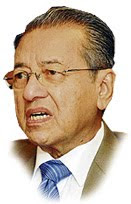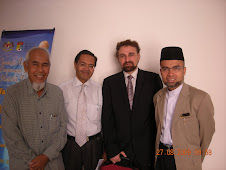Signing Ceremony between Artel Trud Closed Joint - Stock, Altyn Alymak Closed Joint-Stock and IGD Practice Sdn. Bhd., Mandarin Oriental Hotel, Kuala Lumpur
Friday, August 20, 2004
Congratulations on the tie-up between the companies in a venture, involving the extraction of gold and the operating of the Islamic Gold Dinar exchange, and the promotion of the use of the gold Dinar in international trading and in the payment of zakat and dowry.
This venture involving Malaysian and Kazakhstan companies reflects opportunities which can be exploited by the business sectors of Malaysia and Kazakhstan. At the moment, the framework has been established, for promoting cross-border economic activities between the two countries e.g.
Trade Agreement signed in 1996
Investment Guarantee Agreement signed in 1996
Economic / Scientific Agreement and Technical Agreement signed in 1996
Air Services Agreement in 1996
To strengthen the framework for bilateral economic cooperation, the two countries have already concluded negotiations on an agreement for the Avoidance of Double Taxation, while reciprocal visa arrangements, are being negotiated.
With the expected commencement of direct flights, from Almaty to Kuala Lumpur, towards the end of January 2004, there would be direct access to each others economies and markets, for the business communities, in particular, and for the public at large.
Already, bilateral Joint Trade Committees have been established, to facilitate trade and investment flows, as well as, to address constraints faced, by the business communities of both countries.
The regional economic crisis which was triggered by the currency speculation, which severely devalued the regional currencies, have clearly shown how a laissez-faire, unbridled currency trading, fuelled by purely speculative objectives, have created massive dislocations, to economies in the region.
Currencies no longer merely serve as the standard of value, or the medium of exchange, for trade, but currencies have been treated as a trade commodity in themselves, their values not being determined by the strengths of the economies, or the countries themselves, but by what the traders of currency, and the speculators think fit at any one point of time.
In addition, the values of major currencies have been, and certainly will continue to be fixed, not just by the market, but also by policy decision amongst the economic majors.
It cannot be denied that there exist significant uncertainties, and non-predictability, with regards to currencies, which are allowed to be traded in the open market, and these uncertainties and volatilities have impacted and will continue to impact, upon the economies of the individual countries.
Trading and trading margins are affected by shifts in exchange rates, and during times of volatile currency fluctuations, even hedging against such volatilities do not help. In fact, during the regional crisis, businesses lost money on the hedging itself, due to the severe distortions in currency values.
The crisis had eventually resulted, in a re-thinking of the prevailing world monetary system and there was much discussion on the establishment of the so called "new world financial architecture", and, to address the issue of currency speculation. However, nothing significant has materialized to this date.
Malaysia has taken various steps to insulate its economy from the impact of unbridled currency speculation, the major step being, the pegging of the Ringgit to the US Dollar.
This has resulted in the environment of certainty, and predictability, for business and trade, and has enabled business to plan over the longer term, without having to factor in currency exchange volatility.
But still, the US Dollar continues to be the reference, and, as in many other trading economies, trade continues to be denominated in the US Dollar.
Malaysia has, additionally, negotiated arrangements, such as the Trading Account, with individual trading partners, in order to enable bilateral payments on trade, to be settled in the respective national currencies, and thereby reducing the need to use hard currencies, such as the US Dollar, to settle accounts.
But the most recent move by Malaysia is to encourage the use of gold as an effective medium of exchange and in particular, the use of the Gold Dinar.
Clearly, IGD Practice has been established, to effect this alternative approach, by promoting the use of the Gold Dinar in international trading, as well as, in private business and other transactions.
Certainly this is a laudable venture, particularly with the synergy provided by the direct link between gold mining and extraction, and the operations of the Gold Dinar economy.
What is important is the educative process, that must be undertaken, to enable the public, and the business community, to really understand, the mechanisms involved, and the benefits of using gold, as a medium of exchange and a store of value, and of referring to a gold standard.
Although the use of gold had been the main feature of trade and business in history, exposure to the use of paper currency, and the subsequent monetary and trade payment systems, have all but erased, any use of gold as a trade settlement mechanism.
But gold reserves are still an important element in the treasuries of world economies.
The task is now to bring back gold into the trading system, as a safer alternative to current trade settlement, and to minimize currency volatilities.
It is hoped that companies such as IGD Practice will place emphasis upon the educative process, in order that there will be a wide market outreach, and acceptance of the use of gold and gold Dinar in the economy and in trade.
Wednesday, August 12, 2009
Subscribe to:
Post Comments (Atom)







































1 comment:
I am curious, does IGD Practise Sdn. Bhd. still exist. Why can't I open their website www.igdexchange.com? Can you please enlighten me on this matter. Thank you.
Post a Comment